‘Forgettable comforts’: How you can save cash and relieve cost of living pressures
Financial experts have offered surprising tips on what Aussies should be doing to combat cost of living pressures – starting with fuel.
NewsWire
Don't miss out on the headlines from NewsWire. Followed categories will be added to My News.
A fresh oil price surge has all but wiped out the petrol excise cut, with $2 a litre again looming as mere routine for Aussies at the pump.
But as cost of living pressures continue to mount for many families, experts have revealed how you can start saving money immediately and reduce your debt.
The first place to start is at the bowser.
The general manager of car share firm KINTO, Mark Ramsay, estimates the average cost of owning and maintaining two cars already sets city dwellers back about $18,596 a year, a figure he says can be lowered by simple petrol tips.
These include obvious suggestions such as using a petrol app to shop around for the best deal, something he says can save you as much as 30c a litre.

“While premium fuel provides a higher octane rating, it’s perfectly fine to use regular fuel to fill up,” Mr Ramsay says.
Other small things you can do include having inflated tyres and travelling light, both of which can impact the distance that can be done with each litre of petrol.
“If you have a lot of extra weight in the car, this will drain your fuel quicker. Likewise, if you can accelerate more slowly, this will help too,” Mr Ramsay said.
Shopping around is also crucial with car insurance costs.
“Car insurance is one of the biggest expenses, it’s important to shop around to make sure you are getting the most competitive deal or request a loyalty discount from your current provider, Mr Ramsay says.
HPH Solutions financial planner Matt Hern told NCA NewsWire that another thing families could cut out was “forgettable comforts”.
“You won’t miss them. Forgettable comforts include the sweet treat with your morning coffee, takeaway meals or at least cut the home delivery of takeaway,” he said.
“Rather than having multiple streaming services at once, subscribe and binge one service every three months.”
Finance Quarter director and broker Sean Lee told NCA NewsWire that how people spent money on food was a major factor.
“Some quick wins people can look at to save a bit of money is reviewing how often they go out to restaurants and using food delivery services, such as Uber Eats,” he said.

“Meal planning, sticking to a shopping list, bulk cooking and eating in could easily save a couple at least $200 per week.
“Consider replacing more expensive fitness memberships with cheaper alternatives or free outdoor exercises, limit the use of air conditioners and heaters, and turn off any devices that don’t get used often as energy costs are expected to rise.”
Craig McDonald, from CBM Mortgages, has seen Australians start to worry about increasing rate rises over the past two months. He told NewsCorp the first thing people were ditching to combat cost of living pressures was eating out.
The broker, based in Sydney’s eastern suburbs, said: “Clients are conscious of how the banks are scrutinising their day-to-day spending, so the avo on toast and $5 coffees at weekends are the first things to go.”
Financial planner and Edith Cowan University lecturer Damon Brown told NCA NewsWire that entertainment and travel were the main expenses people should dump if they were struggling financially.
“Particularly travel that involves driving based on the fuel costs. The five-hour drive to a camping location and things like that – just because the cost of fuel has just skyrocketed,” he said.
“What used to be a cheap holiday … has become considerably more expensive.”
Mr Brown also agreed food delivery services should be scrapped for anyone trying to save money.
“That’s a discretionary item that can be cut back on. We’ve just got to be better at budgeting food rather than relying on discretionary buys,” he said.
“I don’t think it’s a staple item that you need to have. I ordered out just two nights ago and it cost me $80 … it’s just mental, it just adds up.”

Mr Hern warned having all of your money in a single account made it too easy to overspend.
“Limit your likelihood of overspending impulsively by automatically setting aside money in a separate account every pay to cover your commitments, such as bills and essentials,” he said.
“Also set up automatic savings for your goals and extra debt repayments. Amounts left over may be spent on impulses and indulgences.
“Remove temptation to spend impulsively by unsubscribing from marketing newsletters, and avoid browsing the shops without a list and a set budget.”
Mr Lee agreed having a separate account was a good idea and said it was important for people to set up a budget.
“Record your weekly income, add up your expenses and calculate how much you have left over, if any, to see if this is enough to meet your annual saving goals. If not, adjust your budget and review your expenses,” he said.
“Transfer your budgeted weekly savings to another account to avoid spending this.
“Pay your credit card in full every month to avoid interest charges or don’t use credit cards at all to prevent yourself from getting caught in a debt trap.”

Mr Hern said cutting spending could be confronting, so people should start with quick and easy steps.
“Look at the direct debits from your account and cut subscriptions you no longer use,” he said.
“Next, swap to lower cost versions of your current spending habits.
“For example, take your lunch to work rather than buying it, and rather than dining out, socialise with friends at home with homemade snacks.
“Use public transport or carpool if possible, and refuel your car at the lowest point in the fuel cycle.”
Mr Lee said anyone with a loan should speak to a finance broker.
“This is usually your biggest expense, so it makes sense to review your loan structure and interest rate,” he said.
“More often than not people are paying at least 0.50 per cent per annum more than they should be, and on a $600,000 home loan, this equates to $250 per month in interest savings just by reviewing your home loans.

“The major banks are forecasting the Reserve Bank of Australia to increase interest rates by at least 1 per cent by year end.
“For the average home loan balance, this equates to a minimum $500 per month increase in your mortgage repayments – be prepared and budget for this.”
Mr Lee noted banks were competing hard for business and it paid to shop around.
“Some banks are paying a rebate of up to $6000 for you to refinance your loan to them, subject to certain terms and conditions, which could be an added bonus to the interest savings,” he said.
Mr Brown agreed mortgage holders should review their mortgages.
“Is it still competitive in the market? Because often we find that if we’re stuck in products that are a few years old … there are better products on the market,” he said.
Mr Brown also recommended paying down credit card debt.
“We’re going to see credit card interest rates increase considerably more than what just the Reserve Bank increase in prices,” he said.

Mr Brown said if people were feeling under pressure financially they should feel comfortable to talk about it.
“Speak to family and friends about it. Don’t feel embarrassed about it because there’s a lot of people that are under financial pressure,” he said.
“Historically … for the boomers, it was all very confidential and they never spoke to friends and family if they were under financial pressure.
“I think we’re in a new age now where financial pressures are really common and there’s no judgment.”
Mr Brown said it could save you having to go out with friends and family when you could not afford it.
“Or if your employer wants to offer you opportunities to work from home more so you don’t have to incur the costs of driving to work and things like that,” he said.
Originally published as ‘Forgettable comforts’: How you can save cash and relieve cost of living pressures



